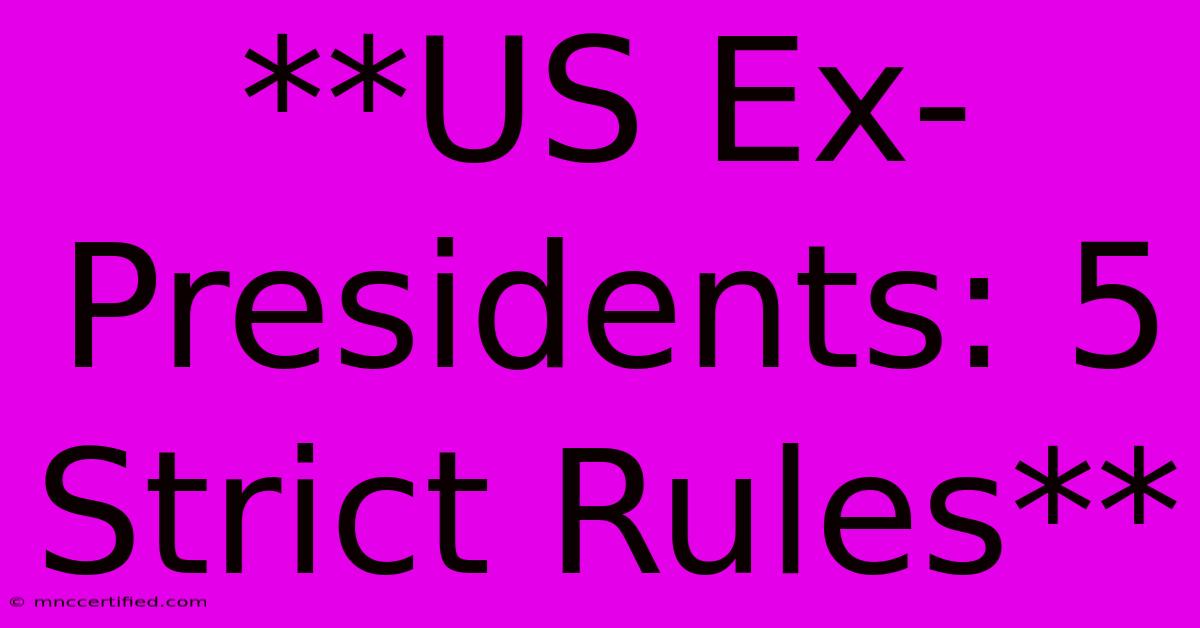**US Ex-Presidents: 5 Strict Rules**

Table of Contents
US Ex-Presidents: 5 Strict Rules They Must Follow
Leaving the White House doesn't mean a complete return to normalcy for former presidents. While they may shed the burdens of office, they still remain bound by a set of rules and protocols designed to protect the integrity of the presidency and the nation. These rules aren't just suggestions; they are regulations enforced by law and custom, shaping the lives of former presidents long after their time in office.
1. The Presidential Records Act: Protecting History and Transparency
One of the most significant rules governing ex-presidents is the Presidential Records Act of 1978. This act mandates that all presidential records, including emails, memos, handwritten notes, and even personal diaries, are considered public property. While there are provisions for confidentiality during a president's lifetime, these records eventually become available to the public. The act aims to ensure transparency and accessibility to historical information, but it also poses a significant challenge for former presidents who might prefer to keep certain aspects of their time in office private.
2. The Ethics in Government Act: Maintaining the Integrity of the Office
The Ethics in Government Act of 1978 establishes strict rules for former presidents regarding lobbying and government employment. While they are free to pursue private endeavors, they are barred from lobbying the government for a period of two years after leaving office. Additionally, they are subject to stringent ethics rules regarding their dealings with foreign governments and businesses. These regulations aim to prevent conflicts of interest and uphold the integrity of the presidency.
3. The Presidential Transition Act: Smooth Transfers of Power
The Presidential Transition Act of 1963 ensures a smooth transition of power between administrations. This act provides resources and support to outgoing presidents and their staffs, assisting them in winding down their affairs and preparing for their post-presidential life. It also establishes procedures for the incoming president to assume office, ensuring continuity in government operations.
4. Secret Service Protection: A Constant Shadow
Despite leaving office, former presidents continue to receive Secret Service protection. The Presidential and Former Presidential Protection Act of 1976 mandates this ongoing security detail, citing the potential for threats to their safety due to their previous positions. This protection extends to their spouses and, in some cases, their children, providing a constant presence of security personnel in their lives.
5. The Presidential Records Act and Historical Preservation: Balancing Public Access and Privacy
The Presidential Records Act raises questions regarding the balance between public access to historical information and protecting the privacy of former presidents. While the act aims to ensure transparency, it also necessitates navigating personal details that might be sensitive or confidential. This ongoing debate highlights the complexities of balancing public interest with the rights and privacy of former presidents.
Conclusion
The lives of former presidents are not entirely free from the constraints of their past positions. They remain bound by a set of rules and regulations that govern their conduct and activities. These rules ensure transparency, integrity, and a smooth transfer of power, while also balancing public interest with the privacy of former presidents. Although these rules may seem restrictive, they ultimately serve to protect the presidency and the nation, ensuring a robust and accountable system of government.

Thank you for visiting our website wich cover about **US Ex-Presidents: 5 Strict Rules**. We hope the information provided has been useful to you. Feel free to contact us if you have any questions or need further assistance. See you next time and dont miss to bookmark.
Featured Posts
-
Aston Villa Dominate Club Brugge In Youth League
Nov 07, 2024
-
Is An Eye Exam Covered By Health Insurance
Nov 07, 2024
-
5 Surprising Ex President Restrictions
Nov 07, 2024
-
Tough On Crime Policies Win Elections
Nov 07, 2024
-
Project 2025 Understanding The Right
Nov 07, 2024